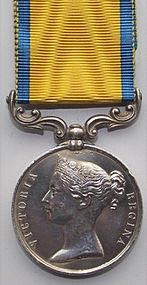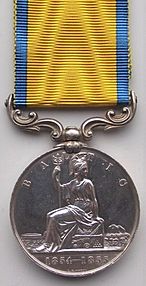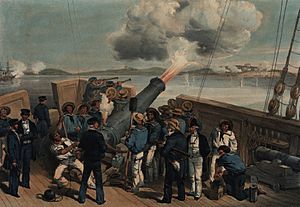Baltic Medal facts for kids
The Baltic Medal was a special award given to brave sailors and soldiers. It was created in 1856 by the United Kingdom of Great Britain and Ireland. This medal honored those who served in the Baltic Sea during a conflict called the Crimean War (specifically, the Åland War) between 1854 and 1855.
Contents
Who Received the Baltic Medal?
The Baltic Medal was given to members of the Royal Navy, Royal Marines, and a special group of engineers called the Royal Sappers and Miners. They all took part in naval operations against Russia in the Baltic Sea.
Even though it was mostly for sailors, 106 Royal Sappers and Miners also received it. These engineers were important because they helped blow up Russian forts at places like Bomarsund and Sveaborg.
What the Baltic Medal Looks Like
The Baltic Medal is a round silver medal. It is about 36 millimeters (or 1.4 inches) wide.
The Front of the Medal (Obverse)
On the front side of the medal, you can see a picture of Queen Victoria. She was the Queen of the United Kingdom at that time. Below her picture, it says "VICTORIA REGINA," which means "Queen Victoria" in Latin. This design was made by an artist named William Wyon.
The Back of the Medal (Reverse)
The back of the medal shows a seated figure of Britannia. Britannia is a symbol of Great Britain, often shown with a helmet and a shield. She is holding a trident, which is a three-pronged spear often associated with the sea.
Behind Britannia, you can see pictures of the fortresses at Bomarsund and Sveaborg. These were important places during the war. Above Britannia, it says "BALTIC," and below her, it shows the dates "1854-1855." This side of the medal was designed by Leonard Charles Wyon.
Ribbon and Naming
The medal's ribbon is about 31.7 millimeters (1.25 inches) wide. It is yellow with light blue edges. These colors are the opposite of the ribbon used for the Crimea Medal.
Most of the Baltic Medals were given out without the recipient's name on them. However, the 106 medals given to the Royal Sappers and Miners had their names and units carved into the edge of the medal. Some sailors also had their medals privately engraved with their names.
 | George Robert Carruthers |
 | Patricia Bath |
 | Jan Ernst Matzeliger |
 | Alexander Miles |





